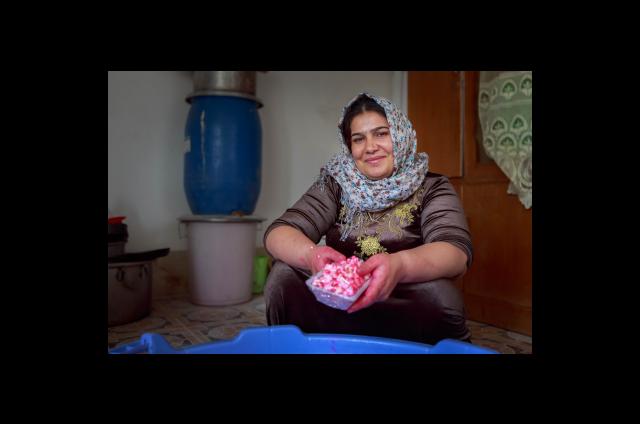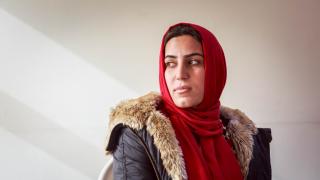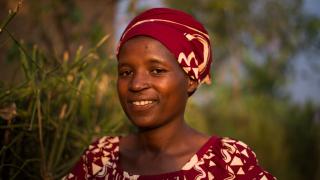Building a Future for Rohingya Refugees in Bangladesh
By land, they wander for days through the jungle and mountains. By sea, they brave fishing boats in the Bay of Bengal’s rough waters. Fleeing the embers of their villages – razed by Myanmar’s military in what the United Nations calls “genocide” – the Rohingya people enter crowded camps full of uncertainty. Women for Women International’s recently-launched Conflict Response Fund aims to give them back some stability.
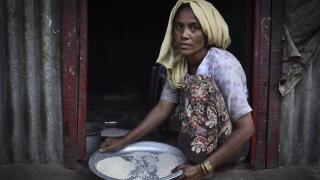
Since August 2017, Myanmar has forced over 700,000 Rohingya refugees, mostly women and children, into makeshift communities at the border of neighbouring Bangladesh. As they wait for either nation to say “Go home” or simply “Go,” the Rohingya people must begin to rebuild their lives so no matter where they land, their society can get back on its feet.
Most crisis efforts focus on traditional life-saving measures, often overlooking the safety of women. Yet women pay a brutal and disproportionate cost during conflict, and they have specific needs as they live through and heal from the trauma. Our Conflict Response Fund, launched in May 2019, allows us to prepare gender-specific support and resources for when women face unexpected crises and immediately respond to violations of their rights.
Displaced Rohingya women face rape, abuse and exploitation
According to a UN Women report, almost every Rohingya refugee woman and girl has either survived or witnessed violence, much of it sexual. The camps offer little privacy and electricity, leaving them exposed and unsafe, especially at night. Along with the threat of assault, some may be kidnapped and sold into sex trafficking by other Rohingya while authorities turn a blind eye.
Yet these women and girls are the future of their community. The crisis threatens to leave a generation of Rohingya “lost” without food, clothing, shelter and the educational opportunities that will help develop their communities. Without investment in their ability to sustain their families and their society, the Rohingya will continue to struggle to survive instead of recover.
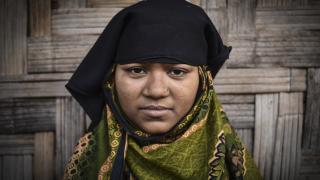
Through the Conflict Response Fund, we’ve partnered with local NGO Research, Training and Management (RTM) International to provide training for these women and girls so they’ll have the vocational skills and income to support their families, start new ones and rebuild their communities – wherever they are.
The fund expands and accelerates RTM International’s work by integrating trainings into the NGO’s existing health centres. Young women and girls can receive training in useful skills that allow women to start small businesses or find paid work.
Having a small enterprise or work that can be done inside or outside the home offers young women a chance to contribute to their family’s income.
Shifting gender stereotypes that limit Rohingya women’s opportunities
Despite these qualifications, women and girls face an uphill struggle within Rohingya society. Social norms and traditional practices limit women’s participation and leadership, access to education and livelihood opportunities. Traditionally, Rohingya women’s work is in the home and unpaid. Leaving the home to work in public is perceived as shameful – even by most other women.
Young women and girls can't reach the height of their potential on their own: We need to bring all kinds of partners together to help clear the barriers in their path.
Together with 100 leaders from the refugee communities and government officials from Bangladesh – where a policy already exists to develop skills for youth nationwide – we are hosting events to encourage people to see young women as drivers of change.
Through “community mobilisation meetings” with Rohingya youth, we are educating people on why ensuring women and girls have job skills is key to rebuilding Rohingya communities – and where and when they can sign up to learn.
Standing with Rohingya refugee women on World Refugee Day
Local organisations like RTM are doing incredible work on the ground with limited resources. They desperately need help transforming the Rohingya’s uncertain present into a more confident, resilient future.
A global crisis calls for global partners. We are committed to making this vital work possible and ensuring that Rohingya women get the support they need to build a better future for their families, their communities and themselves.
About the Conflict Response Fund
Women for Women International launched the Conflict Response Fund in May 2019 to meet the specific needs of women facing the immediate impact of conflict and instability. Through this Fund, we have committed to two new countries, Yemen and Myanmar. Working alongside local partners, we will be providing support for displaced persons and survivors of gender-based violence in Yemen, as well as Rohingya women from Myanmar living at the Bangladesh border.
Further Reading
April 2018 | We shared our recent livelihoods research with experts and practitioners to discuss the wider implications of the findings.
The roundtable attendees discussed the need to consider long-term empowerment for women in fragile contexts alongside the needs for funding and access to justice.
Carron Mann, Head of Policy and Advocacy, highlights our engagement with the UN’s 63rd Session of the Commission on the Status of Women, a key space for us to share our evidence and amplify the voices of the women we serve with key influencers.
In 2019, a quarter of a century on from the genocide, we celebrate the rise of Rwanda from the ashes of conflict, and the elevation of women's voices. The challenge of creating a lasting peace depended greatly on the actions of women, who were the majority of survivors.

